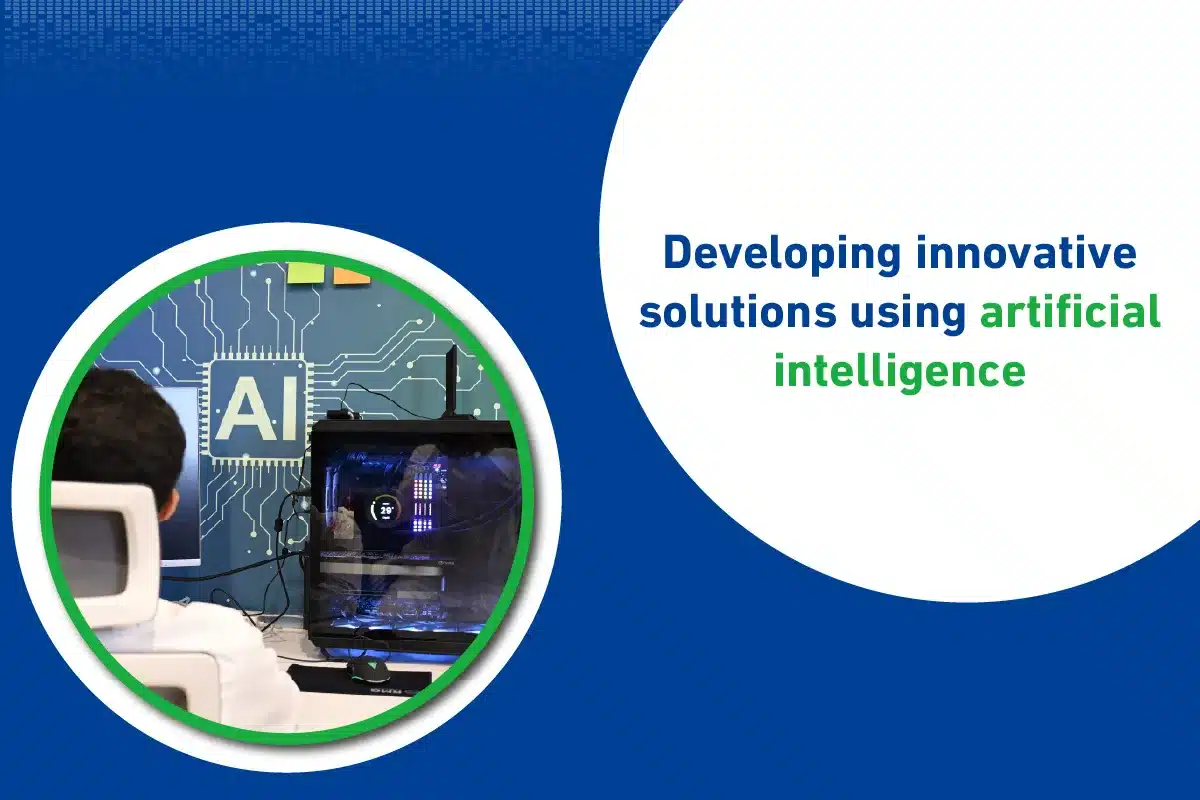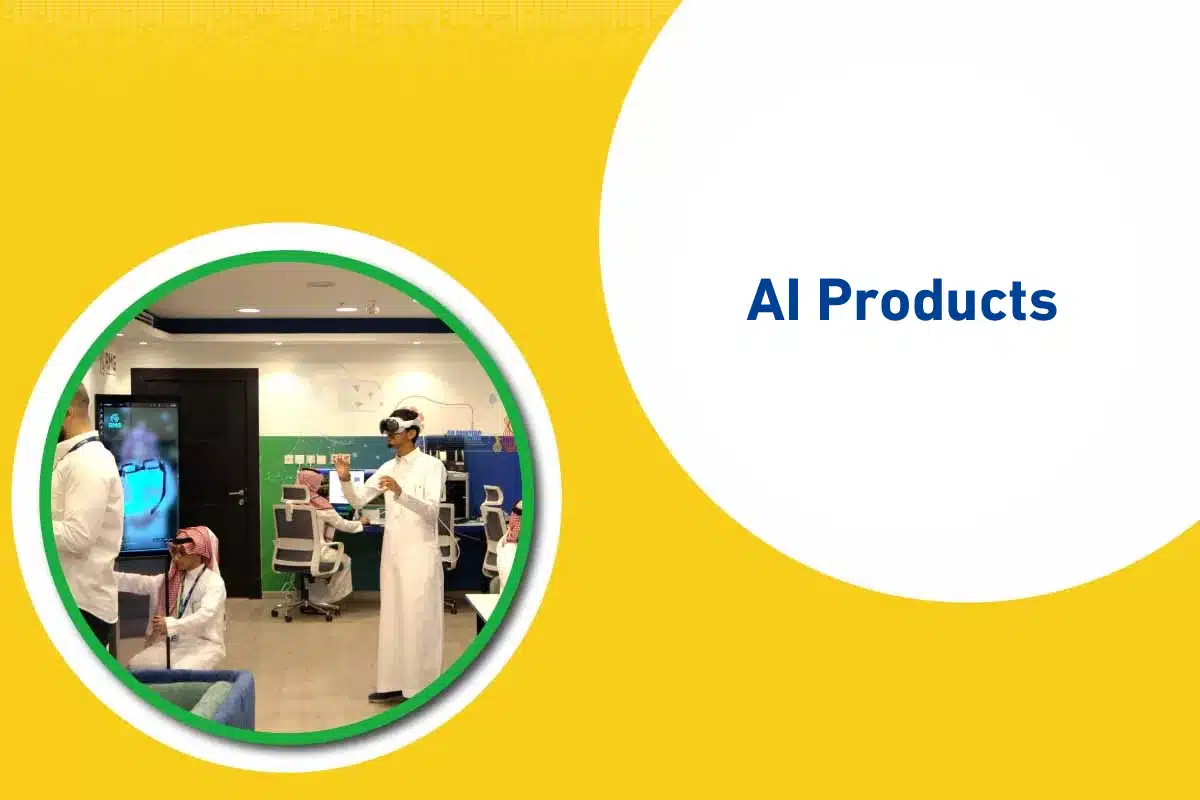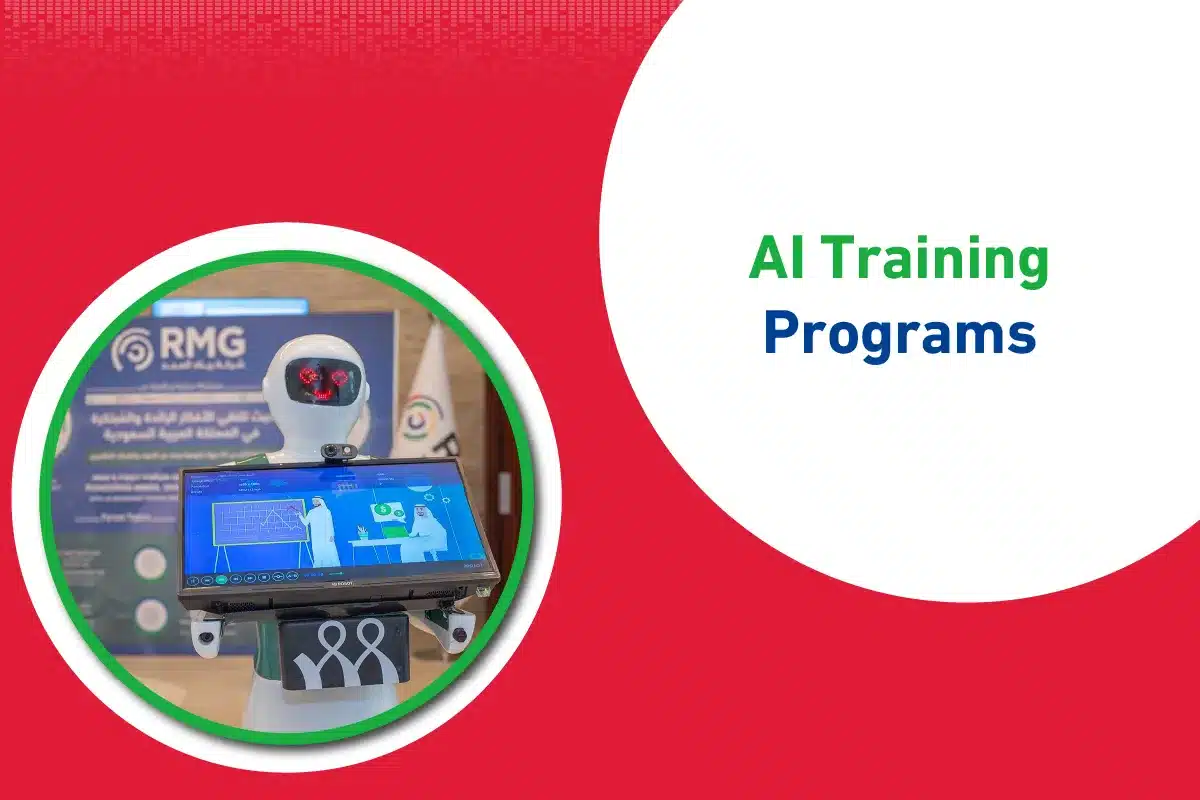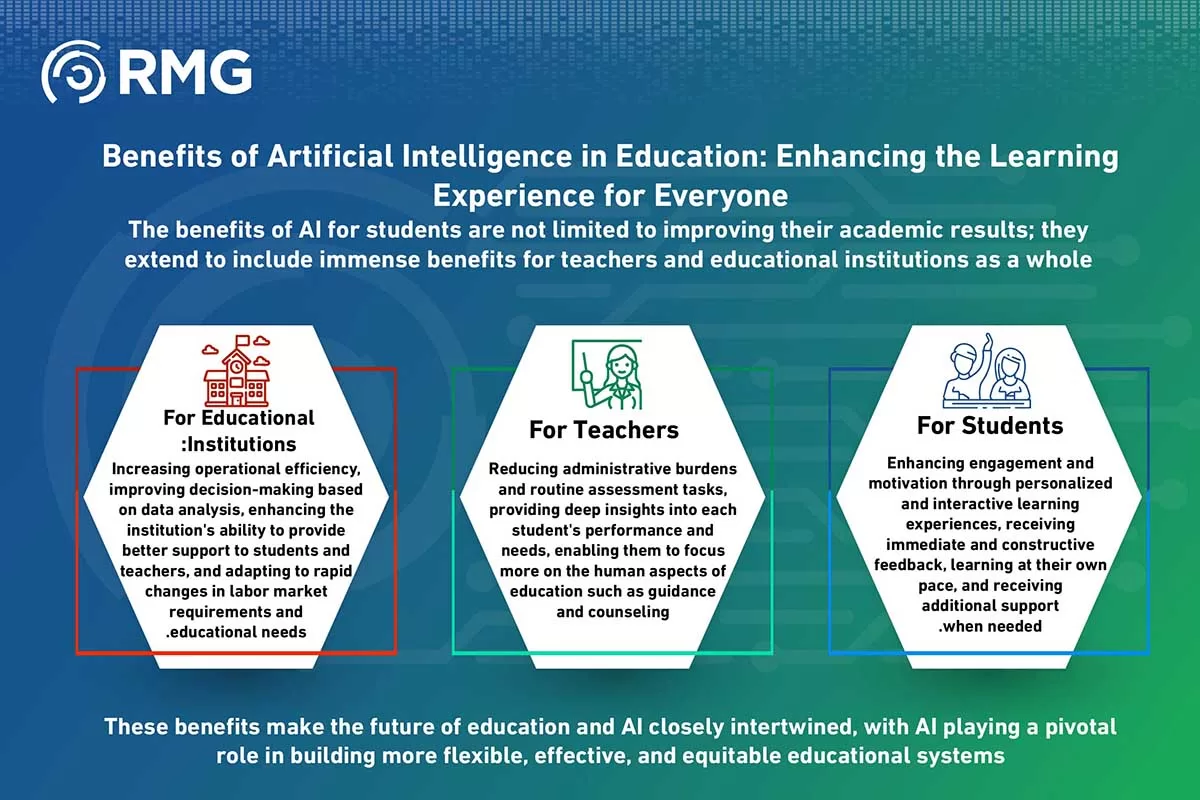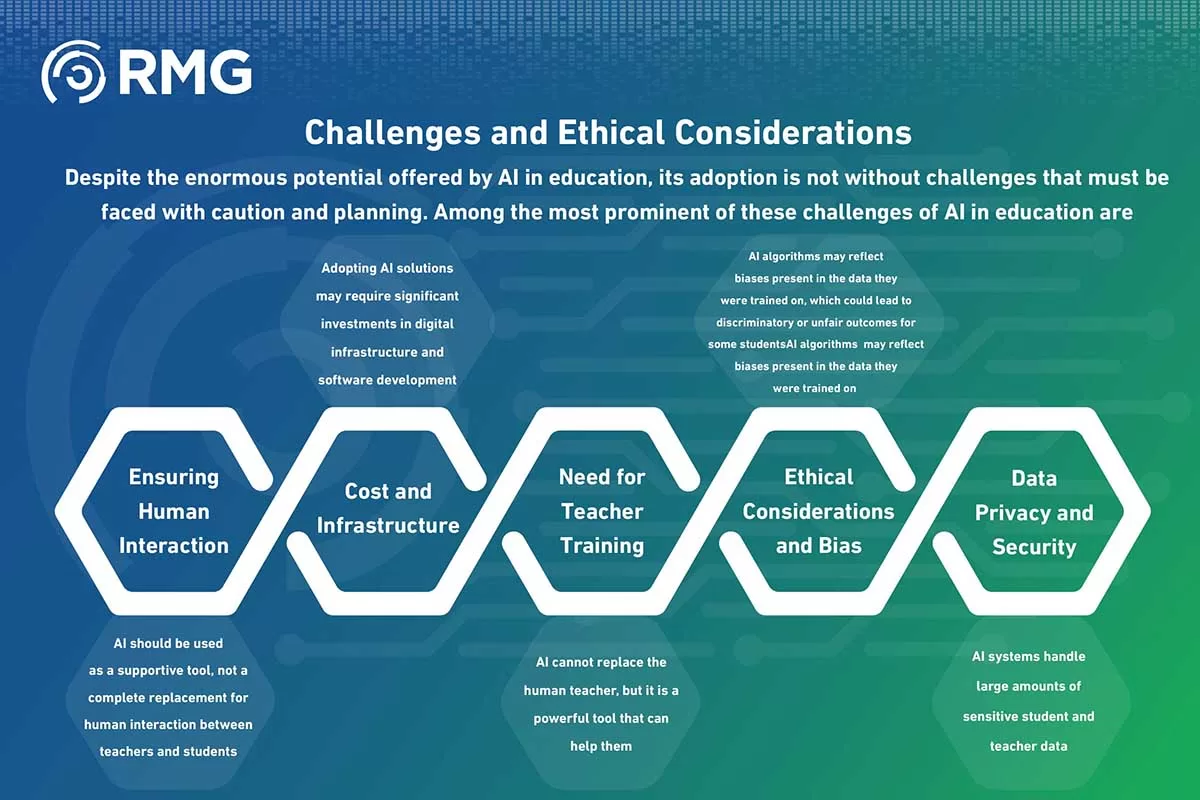Blog Body
Discover how Artificial Intelligence (AI) applications in education are bringing about a significant revolution. Learn about its most prominent applications in personalizing learning, assessing students, and automating tasks. Explore the future of education with the help of AI and Renad Al Majd’s specialized services to transform your educational institution.
In an era where technological development is accelerating at an unprecedented pace, Artificial Intelligence (AI) emerges as a driving force for radical transformations across various sectors, and the education sector is no exception to this rule. Talking about AI applications in education is no longer just a future vision; it has become a tangible reality shaping the features of the educational process and opening new horizons for learning, teaching, and administration. Integrating AI solutions into educational institutions, from primary schools to universities and higher education institutions, promises to improve efficiency, enhance the learning experience, and empower both teachers and students. This article aims to delve into the depths of AI applications in education, review its most prominent uses, highlight its immense benefits, and discuss the accompanying challenges, with a focus on the role played by specialized companies in providing these solutions, foremost among them Renad Al Majd Company, in achieving this promising digital transformation.
What is Artificial Intelligence in the Context of Education?
The term Artificial Intelligence in education refers to the use of systems and software capable of simulating human abilities such as learning, problem-solving, and decision-making, with the aim of improving various aspects of the educational process. The role of AI is not limited to merely automating tasks; it extends to include analyzing big data, predicting student needs, and customizing educational content to suit individual abilities, reflecting the role of AI in education as a powerful enabling tool. This advanced use of technology represents a qualitative leap towards more effective, equitable, and adaptive education.
Key Applications of Artificial Intelligence in Education Reshaping Classrooms
AI applications in education are diverse, covering various levels of the educational process, from direct interaction with students to managing educational institutions. Among the most prominent of these applications are:
- Personalized Learning Paths: This is perhaps one of the most powerful applications of AI in education. AI systems can analyze student performance data, learning speed, preferred learning style, and strengths and weaknesses. Based on this analysis, systems can provide personalized educational content, recommend additional resources, suggest targeted exercises, and adjust the pace of explanation to suit each student individually. This helps in meeting individual needs that are difficult for teachers to address in crowded traditional classrooms and significantly contributes to enhancing the benefits of AI for students.
- Intelligent Tutoring Systems: These systems act as an automated tutor providing support and guidance to students outside of class time. They can answer student questions, provide additional explanations, and offer interactive exercises with immediate and detailed feedback. These systems use AI to understand student responses and adapt the difficulty level and explanation method based on their performance, providing continuous individual support.
- Automated Grading and Assessment: AI can automate a large part of assessment tasks, especially for objective questions or essays with a specific format. This saves valuable time for teachers that they can use for direct interaction with students and providing individual support. Additionally, AI tools can analyze student answers to provide constructive and immediate feedback, helping students understand their mistakes and improve their performance faster. This represents a significant development in the field of student assessment with AI.
- Predictive Analytics to Identify At-Risk Students: AI systems can analyze vast amounts of student data (such as attendance, participation, performance in assignments and tests) to identify students who may face academic or behavioral difficulties before problems escalate. This allows educational institutions and teachers to intervene early and provide the necessary support, whether academic or psychological, which enhances student success rates and reduces dropout rates.
- Virtual Assistants and Chatbots: AI-powered chatbots can be used to answer frequently asked questions from students, parents, and staff regarding administrative procedures, deadlines, general information about the institution, and more. This reduces the burden on administrative staff and ensures information is available around the clock, enhancing the efficiency of classroom management with AI and expanding the scope of administrative support.
- Content Creation and Curation: AI tools can assist teachers in creating diverse educational content, such as presentations, summaries, or even prototypes for interactive exercises. They can also suggest and compile relevant educational resources suitable for students’ levels and interests from various online sources, enriching the educational process.
- Administrative Tasks Automation: In addition to direct interaction with students, AI can help automate many routine administrative tasks for educational institutions, such as scheduling classes, managing student databases, processing registration requests, and communicating with parents. This frees up staff time to focus on more important and interactive tasks.
Benefits of Artificial Intelligence in Education: Enhancing the Learning Experience for Everyone
The benefits of AI for students are not limited to improving their academic results; they extend to include immense benefits for teachers and educational institutions as a whole:
- For Students: Enhancing engagement and motivation through personalized and interactive learning experiences, receiving immediate and constructive feedback, learning at their own pace, and receiving additional support when needed.
- For Teachers: Reducing administrative burdens and routine assessment tasks, providing deep insights into each student’s performance and needs, enabling them to focus more on the human aspects of education such as guidance and counseling, and providing supportive tools for lesson planning and activity design.
- For Educational Institutions: Increasing operational efficiency, improving decision-making based on data analysis, enhancing the institution’s ability to provide better support to students and teachers, and adapting to rapid changes in labor market requirements and educational needs.
These benefits make the future of education and AI closely intertwined, with AI playing a pivotal role in building more flexible, effective, and equitable educational systems.
Challenges and Ethical Considerations
Despite the enormous potential offered by AI in education, its adoption is not without challenges that must be faced with caution and planning. Among the most prominent of these challenges of AI in education are:
- Data Privacy and Security: AI systems handle large amounts of sensitive student and teacher data. Ensuring the privacy of this data and protecting it from unauthorized access or breaches is a major challenge that requires implementing strict policies and high-security standards.
- Ethical Considerations and Bias: AI algorithms may reflect biases present in the data they were trained on, which could lead to discriminatory or unfair outcomes for some students. These systems must be developed and audited carefully to ensure fairness and equity.
- Need for Teacher Training: AI cannot replace the human teacher, but it is a powerful tool that can help them. Integrating AI requires training teachers on how to use these tools effectively, understanding their capabilities and limitations, and how to integrate them into their teaching practices.
- Cost and Infrastructure: Adopting AI solutions may require significant investments in digital infrastructure and software development, which can be a challenge for educational institutions with limited resources.
- Ensuring Human Interaction: AI should be used as a supportive tool, not a complete replacement for human interaction between teachers and students. This interaction is vital for students’ social and emotional development.
Addressing these challenges requires a comprehensive approach involving collaboration among policymakers, technology experts, and practitioners in the field of education.
Renad Al Majd Company: Your Partner in the Digital Transformation Journey for Education with AI
With the increasing importance of AI applications in education, there is a growing need for specialized partners who possess the expertise and ability to provide innovative and reliable solutions that meet the changing needs of educational institutions. Here lies the role of Renad Al Majd Company, which is one of the leading companies in providing integrated information technology solutions and pays special attention to enabling the education sector to maximize its benefit from AI technologies.
Renad Al Majd Company understands that integrating AI into education is not just about purchasing software; it is a comprehensive transformation process that requires a deep understanding of the needs and goals of the educational process. Therefore, the company offers a comprehensive package of AI services for education specifically designed to help educational institutions successfully adopt these technologies. These services include, but are not limited to:
- Specialized Consultations: Renad Al Majd provides strategic consultations to educational institutions to assess their needs, identify the most suitable opportunities for applying AI, and develop clear and phased action plans for digital transformation.
- Development and Implementation of Smart Learning Platforms: The company designs and develops educational platforms that utilize AI to provide personalized learning experiences, automated assessment systems, and student performance analysis tools.
- Administrative Task Automation Solutions: Renad Al Majd provides AI-powered systems to automate repetitive administrative tasks, contributing to the improvement of operational efficiency for educational institutions.
- Predictive and Analytical Systems: The company helps educational institutions implement AI systems for data analysis and predicting future trends, such as identifying students at risk of academic delay or dropout, to enable early intervention.
- Building and Training AI Models: Renad Al Majd has expertise in building and customizing AI models to meet specific educational needs, such as natural language processing models to understand student responses or sentiment analysis models to gauge their engagement.
- Training and Technical Support: Renad Al Majd’s role is not limited to providing technical solutions; it also includes training educational and administrative staff on how to use these tools effectively and providing continuous technical support to ensure smooth operations.
By providing integrated AI solutions for educational institutions, Renad Al Majd Company seeks to empower education leaders to seize digital transformation opportunities, provide higher quality education that meets the needs of 21st-century students, and contribute to building the future of education and AI in the region. The company’s commitment to innovation and quality makes it the ideal partner for ambitious educational institutions seeking to adopt the latest AI technologies.
The Future of Artificial Intelligence in Education: Towards New Horizons
The future of education and AI looks promising and exciting. As technologies continue to evolve, we can expect to see more advanced applications, such as:
- AI-Powered Augmented and Virtual Reality: Creating immersive and interactive learning environments that respond to student behavior and adapt content based on it.
- Personalized Lifelong Learning Assistants: AI systems that accompany individuals throughout their educational and professional journey, providing them with recommendations for continuous learning and helping them develop their skills.
- Advanced Student Behavior Analysis: A deeper understanding not only of what the student learns, but how they learn, and the motivations behind their behavior, to provide more comprehensive support.
AI will not replace the human teacher but will change their role to become more focused on guidance, counseling, and developing soft skills that machines cannot easily replicate. The teacher will become a facilitator of learning, leveraging AI tools to enhance their experience and that of their students.
Leading the Educational Transformation
AI applications in education are not just a technological luxury; they have become an imperative necessity for institutions seeking to keep pace with global developments and provide high-quality education suitable for the challenges of the future. From personalizing learning paths and improving assessment to automating administrative tasks and providing valuable insights, AI has the potential to bring about a radical and positive transformation in all aspects of the educational process. Achieving these capabilities requires strategic adoption, investment in infrastructure, and qualifying human resources.
Leveraging the capabilities of AI requires a reliable partner with the necessary expertise and vision. Renad Al Majd Company, with its extensive experience and commitment to providing AI services for education, is the ideal partner for educational institutions aspiring to lead this digital transformation and elevate the quality of education they provide.
Start Your Educational Institution’s Digital Transformation Journey Today
If you seek to empower your educational institution with the latest AI applications in education and benefit from innovative AI solutions for educational institutions, Renad Al Majd Company is your optimal choice.
To benefit from Renad Al Majd Company’s specialized services in AI applications for education, and to get a consultation on how to integrate these technologies into your institution, please contact us today through the following form:







